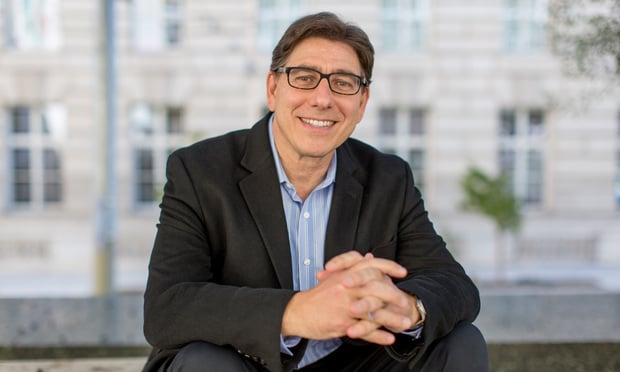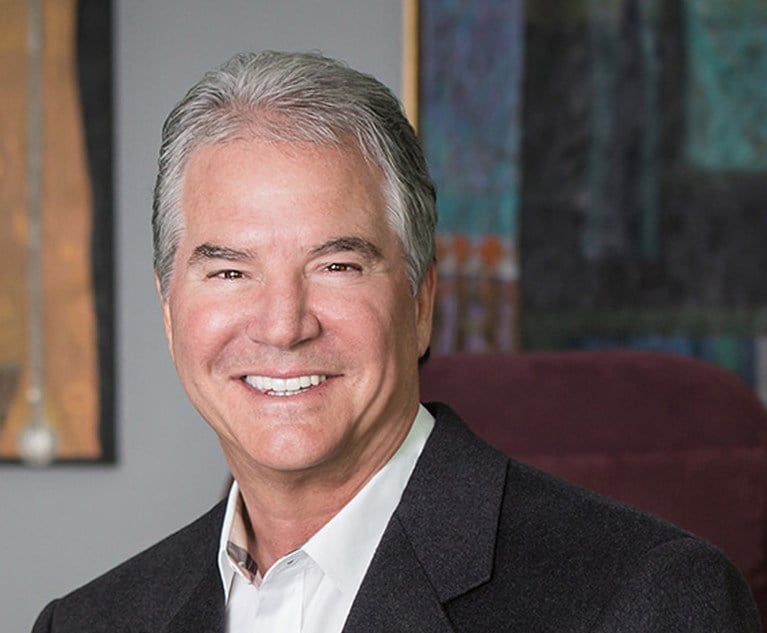UC Hastings Dean: After COVID-19 a 'Simmering Problem' in SF's Tenderloin Neighborhood 'Has Boiled Over'
David Faigman, the chancellor and dean of the University of California, Hastings College of Law, discusses his decision to have the school join a lawsuit brought on behalf of residents and businesses in San Francisco's Tenderloin district demanding action to address tent encampments and drug dealing on neighborhood sidewalks.
May 07, 2020 at 06:32 PM
10 minute read
 David Faigman, Hastings College of the Law. (Photo: Jason Doiy/ALM)
David Faigman, Hastings College of the Law. (Photo: Jason Doiy/ALM)
There have been plenty of firsts this semester for David Faigman, the chancellor and dean of the University of California, Hastings College of the Law, as the school has adapted to life during the COVID-19 pandemic. On Monday, the dean added another first to that list as he led the school to join a lawsuit as a plaintiff against the city and county of San Francisco. The school joined other residents and businesses in the city's Tenderloin neighborhood claiming in a federal lawsuit that San Francisco officials have allowed the area to become "a containment zone" for drug and homelessness issues—issues further complicated by the current public health crisis.
Faigman this week spoke with The Recorder about his decision to file suit against the city and what he hopes the lawsuit accomplishes. The following has been edited for length and clarity.
The Recorder: I gather that the decision to sue the city wasn't one that you as the dean took lightly. Why do you think this lawsuit was the right course for the school and why now?
David Faigman: The short of it is that the Tenderloin always has been a challenged neighborhood. Over time we've had difficulties with security and health and safety, and we've spent a great deal of money supplementing what the city is required to provide. So, it's been a simmering problem for some time. With COVID-19, that simmer has now boiled over. We hit a tipping point where we could no longer tolerate having the Tenderloin operate as a containment zone to the city of San Francisco and having all the problems that the city faces with homelessness and with drug dealing and with other challenges to the urban environment be contained in our 50 square blocks of the Tenderloin.
You said in the press conference announcing the suit's filing that the decision to sue was yours as the dean. Under what circumstances do the school's governing documents authorize you to engage in litigation on behalf of the school?
So I am the chief executive officer of UC Hastings Law. Under our bylaws, I have the authority to be involved in litigation. I report to a board of directors, which, of course, is nominated by the governor and confirmed by the senate. But they are a policy board, and I am responsible for operations.
Have you taken action as the plaintiff in a lawsuit before in your tenure?
No, I have not. We've been a defendant in suits, as is natural for an organization. But this is my first experience as a plaintiff.
What, if any, feedback have you had from the board?
I obviously would have let the board know before we would have gone down this path. So the board has been supportive of this effort, and they understand the challenges the school faces in the neighborhood and also have been frustrated over the years at the lack of responsiveness on the part of the city of San Francisco to what's happening on the streets around our campus.
Where are you riding out the pandemic? Have your job duties taken you to the neighborhood? Have you been to the school recently and seen the conditions on the street?
I have seen the conditions on the street through videos and photographs. Our executive director of operations, Rhiannon Bailard, does visit campus three-to-four times a week. Our facilities folks are on campus. Our securities folks are on campus. We now have approximately 160 students living in our residence apartment building at 100 McAllister, and so they are facing the situation on the streets day-to-day. UCSF Police Department is our security force, and so they report to me regularly. I well understand what's happening. I hear from our students all the time. I hear from our staff who are there day-to-day, hour-to-hour dealing with what's happening on the streets.
What has the law school community's response to the suit been like?
I would say that my message to the community that went out following the lawsuit—I've received more emails about that than I've gotten in response to any other message to our community. And I would say the response has been about 100 to 1 in favor of the lawsuit. I think I've received in total about three emails that have been critical of the decision and the rest, well over 150, have ranged from enthusiastic to being wildly enthusiastic.
Briefly, what are the goals of the lawsuit?
So the suit, just to be clear about it, is on behalf of the residents, the businesses, those who live in the Tenderloin who are having to get around the streets and maneuvering around tents and getting in and out of doorways. But the ultimate solution, I think, will serve both the housed and the unhoused folks in the Tenderloin. What we're aiming to do is get the streets clear and by clearing the streets [I mean] moving folks who are living on the streets to safe encampments where they can be provided toilets, washing facilities, medical supervision, COVID-19 testing. No one who is living on the streets wants to be dealing with the situations that they're dealing with—being in tents right on top of one another, tents that four, or five, or six people are sharing. The city needs to find campgrounds in the immediate term, give these folks an opportunity to have a safe environment, provide the medical services and sanitary facilities that are necessary to protect them.
At the same time, those that are living housed and the merchants in the neighborhood need to have clear streets just like the other neighborhoods in San Francisco. This is about fundamental fairness: If this situation were happening in the Marina or Russian Hill or Nob Hill, it would not be tolerated for more than a few minutes, yet in the Tenderloin it seems to be the policy, almost the strategy, to maintain it.
The city hasn't yet responded in court papers but it did release a revised Tenderloin Neighborhood Plan for COVID-19 yesterday? Have you had a look at it?
Oh yes. I've read it in detail, and it's entirely inadequate.
What, in your estimation, is inadequate about it?
Well the immediate plan, the only encampment it has is on Fulton Street, which has 90 tents already there. The public health recommendation is to reduce that to about 50 tents. So that means there are 40 folks that have to move elsewhere, and there's been no other place identified for them to move. My expectation is that they would end up on the streets of the Tenderloin just like everybody else. And the solution that they've come up with is to close down streets in the near-term, add some washing stations, maybe some toilets. But how is that going to help those who are in wheelchairs and the elderly and the children who live in the Tenderloin? They're still going to have to walk out their doors if they can get out their doors and maneuver around the folks who are occupying the streets.
I was a big fan of "The Wire." This is the Hamsterdam approach. But, unfortunately, this is a residential community that has more children per capita than any other neighborhood in San Francisco. The other problem is the city's plan announced yesterday says virtually nothing except one throwaway line about drug dealing. Drug dealing in those areas right now is rampant. The laws are not being enforced and that needs to stop. It is bringing elements to the doorsteps of the residents of the Tenderloin and that is simply intolerable.
Are you at all concerned that city resources that could be used for dealing with the issues on the street are going to be diverted to responding to this lawsuit?
Well, the city attorney doesn't really need to spend that much money defending the lawsuit. What we're hoping is something like what has happened in Los Angeles. This is a lawsuit that was built in parallel to the one that was filed in Los Angeles. In that case, the mayor welcomed the lawsuit and immediately starting working with the federal judge, Judge David Carter. Judge Carter went out onto the streets to get a sense of what was going on and they are sitting down and working on a solution.
So, I see this lawsuit as an opportunity for the city to work with a federal judge. Judge Jon Tigar, who is a very energetic, very smart judge, has been appointed to the case. And this is an opportunity to get us together to solve this. It doesn't take much in the way resources to respond to this lawsuit compared to the resources that ought to be invested in the community in protecting all residences of San Francisco.
The mayor did address the lawsuit in a press conference earlier in the week saying: "I don't think it is helpful that we have people who unfortunately are taking this route." Do you at all worry this will sour the school's relationship with the city?
We've always had a very good relationship with the city, and we did not name the mayor in this suit. I don't think it's just the mayor's issue. It's the city and county's issue to resolve. The mayor is the leader, and she's been proactive. She was one of the first to declare an emergency over COVID-19, and she's done very well in many respects. What we are disappointed about is there appears to be no real political solution to what's happening in the Tenderloin. We believe there needs to be a nonpolitical solution. And the way that you get there is through the guidance and assistance of a federal judge who will ensure that the laws of the United States, the laws of the state of California, and local ordinances are followed.
This is coming at the end of a semester that I can only imagine has been momentously challenging for you. What has this period been like for you and the school?
So we were ahead of the curve somewhat. We had all of our classes online by the second week of March. And our faculty and our staff were amazingly responsive. Our IT department was spectacular. Our students stepped up and moved into this environment quickly.
You're correct. It's been a difficult time. It's been a difficult time for all institutions of higher education, but I would say I'm incredibly proud of our community for its ability to respond to an unprecedented and difficult time. And we continue to do that and are planning for the fall under a number of different contingencies–from hopefully being back on campus and fully operational to having some sort of more hybrid model of curriculum being offered.
This content has been archived. It is available through our partners, LexisNexis® and Bloomberg Law.
To view this content, please continue to their sites.
Not a Lexis Subscriber?
Subscribe Now
Not a Bloomberg Law Subscriber?
Subscribe Now
NOT FOR REPRINT
© 2025 ALM Global, LLC, All Rights Reserved. Request academic re-use from www.copyright.com. All other uses, submit a request to [email protected]. For more information visit Asset & Logo Licensing.
You Might Like
View All
Assessing the Second Trump Presidency’s Impact on College Sports


LSAT Administrator Sues to Block AI Tutor From Using ‘Famous, Distinctive’ Test Prep Materials
3 minute readTrending Stories
- 1Gunderson Dettmer Opens Atlanta Office With 3 Partners From Morris Manning
- 2Decision of the Day: Court Holds Accident with Post Driver Was 'Bizarre Occurrence,' Dismisses Action Brought Under Labor Law §240
- 3Judge Recommends Disbarment for Attorney Who Plotted to Hack Judge's Email, Phone
- 4Two Wilkinson Stekloff Associates Among Victims of DC Plane Crash
- 5Two More Victims Alleged in New Sean Combs Sex Trafficking Indictment
Who Got The Work
J. Brugh Lower of Gibbons has entered an appearance for industrial equipment supplier Devco Corporation in a pending trademark infringement lawsuit. The suit, accusing the defendant of selling knock-off Graco products, was filed Dec. 18 in New Jersey District Court by Rivkin Radler on behalf of Graco Inc. and Graco Minnesota. The case, assigned to U.S. District Judge Zahid N. Quraishi, is 3:24-cv-11294, Graco Inc. et al v. Devco Corporation.
Who Got The Work
Rebecca Maller-Stein and Kent A. Yalowitz of Arnold & Porter Kaye Scholer have entered their appearances for Hanaco Venture Capital and its executives, Lior Prosor and David Frankel, in a pending securities lawsuit. The action, filed on Dec. 24 in New York Southern District Court by Zell, Aron & Co. on behalf of Goldeneye Advisors, accuses the defendants of negligently and fraudulently managing the plaintiff's $1 million investment. The case, assigned to U.S. District Judge Vernon S. Broderick, is 1:24-cv-09918, Goldeneye Advisors, LLC v. Hanaco Venture Capital, Ltd. et al.
Who Got The Work
Attorneys from A&O Shearman has stepped in as defense counsel for Toronto-Dominion Bank and other defendants in a pending securities class action. The suit, filed Dec. 11 in New York Southern District Court by Bleichmar Fonti & Auld, accuses the defendants of concealing the bank's 'pervasive' deficiencies in regards to its compliance with the Bank Secrecy Act and the quality of its anti-money laundering controls. The case, assigned to U.S. District Judge Arun Subramanian, is 1:24-cv-09445, Gonzalez v. The Toronto-Dominion Bank et al.
Who Got The Work
Crown Castle International, a Pennsylvania company providing shared communications infrastructure, has turned to Luke D. Wolf of Gordon Rees Scully Mansukhani to fend off a pending breach-of-contract lawsuit. The court action, filed Nov. 25 in Michigan Eastern District Court by Hooper Hathaway PC on behalf of The Town Residences LLC, accuses Crown Castle of failing to transfer approximately $30,000 in utility payments from T-Mobile in breach of a roof-top lease and assignment agreement. The case, assigned to U.S. District Judge Susan K. Declercq, is 2:24-cv-13131, The Town Residences LLC v. T-Mobile US, Inc. et al.
Who Got The Work
Wilfred P. Coronato and Daniel M. Schwartz of McCarter & English have stepped in as defense counsel to Electrolux Home Products Inc. in a pending product liability lawsuit. The court action, filed Nov. 26 in New York Eastern District Court by Poulos Lopiccolo PC and Nagel Rice LLP on behalf of David Stern, alleges that the defendant's refrigerators’ drawers and shelving repeatedly break and fall apart within months after purchase. The case, assigned to U.S. District Judge Joan M. Azrack, is 2:24-cv-08204, Stern v. Electrolux Home Products, Inc.
Featured Firms
Law Offices of Gary Martin Hays & Associates, P.C.
(470) 294-1674
Law Offices of Mark E. Salomone
(857) 444-6468
Smith & Hassler
(713) 739-1250







